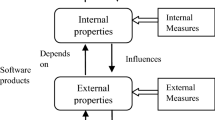Abstract
Maintainability of the software is well-thought-out as one of the vital quality that software should possess according to ISO standards. Software Maintainability Assessment (SMA) of aspect oriented software has been a focus of research for some time. Statistical and machine learning approaches have been used for assessing the maintainability of software. Fuzzy logic acts as an alternative approach to SMA of aspect oriented systems. Fuzzy logic has emerged as an important tool for use in a variety of applications that range from control system engineering to the design of automated intelligence systems. Fuzzy logic has the ability to deal with uncertainty and multivalued data and does not rely on historic data. This characteristic of data free model building enhances the prospect from using fuzzy logic for software metrics. The paper presents a fuzzy logic based algorithm for SMA of aspect oriented systems.
Access this chapter
Tax calculation will be finalised at checkout
Purchases are for personal use only
Similar content being viewed by others
References
Elrad, Tzilla, Robert E. Filman, and Atef Bader. “Aspect-oriented programming: Introduction. “Communications of the ACM 44.10 (2001): 29–32.
Kiczales, Gregor, et al. “An overview of AspectJ. “ECOOP 2001—Object-Oriented Programming. Springer Berlin Heidelberg, 2001. 327–354.
Eaddy, Marc, Alfred Aho, and Gail C. Murphy. “Identifying, assigning, and quantifying crosscutting concerns. “Proceedings of the First International Workshop on Assessment of Contemporary Modularization Techniques. IEEE Computer Society, 2007.
Bandi, R.K, Vaishnavi V.K., Turk, D.E.,. Predicting maintenance performance using object-oriented design complexity metrics. IEEE Transaction on Software Engineering 29(1) 2003, 77–87.
Li, Wei, and Sallie Henry. “Object-oriented metrics that predict maintainability.” Journal of systems and software 23.2 (1993): 111–122.
Sivanandam, S. N., Sai Sumathi, and S. N. Deepa. Introduction to fuzzy logic using MATLAB. Vol. 1. Berlin: Springer, 2007.
MacDonell, Stephen G., Andrew R. Gray, and James M. Calvert. “FULSOME: fuzzy logic for software metric practitioners and researchers.” Neural Information Processing, 1999. Proceedings. ICONIP’99. 6th International Conference on. Vol. 1. IEEE, 1999.
Ryder, Jack. “Fuzzy modeling of software effort prediction.” Information Technology Conference, 1998. IEEE. IEEE, 1998.
Zadeh, L. A., 1965, “Fuzzy Sets, Information and Control”, vol. 8 (338–353).
Von Altrock, C., B. Krause, and H-J. Zimmerman. “Advanced fuzzy logic control of a model car in extreme situations.” Fuzzy Sets and Systems 48.1 (1992): 41–52.
Klir, George, and Bo Yuan. Fuzzy sets and fuzzy logic. Vol. 4. New Jersey: Prentice Hall, 1995.
Kantrowitz, Mark, Erik Horskotte, and Cliff Joslyn. “Answers to frequently asked questions about fuzzy logic and fuzzy expert systems.” Comp. ai. fuzzy, November 1997. ftp. cs. cmu. edu:/user/ai/pubs/faqs/fuzzy/fuzzy. faq (1997).
Dubois, Didier, and Henri Prade. “Random sets and fuzzy interval analysis.” Fuzzy Sets and Systems 42.1 (1991): 87–101.
Grauel, A., and L. A. Ludwig. “Construction of differentiable membership functions.” Fuzzy sets and systems 101.2 (1999): 219–225.
Tarr, Peri, et al. “N degrees of separation: multi-dimensional separation of concerns.” Proceedings of the 21st international conference on Software engineering. ACM, 1999.
Kiczales, Gregor, et al. Aspect-oriented programming. 11th European Conference on Object Oriented Programming in: LNCS, vol. 1241, Springer Verlag,1997, pp 220–242 1997.
Kvale, Axel Anders, Jingyue Li, and Reidar Conradi.” A case study on building COTS-based system using aspect-oriented programming. “Proceedings of the 2005 ACM symposium on Applied computing. ACM, 2005.
Kumar, Avadhesh, Rajesh Kumar, and P. S. Grover. “An evaluation of maintainability of aspect-oriented systems: a practical approach.” International Journal of Computer Science and Security 1.2 (2007): 1–9.
Bandini, S., Paoli, F. D., Manzoni, S., Mereghetti, P., 2002. A support system to COTS based software development for business services, Proceedings of the 14th International Conference on Software Engineering and Know ledge Engineering, Ischia, Italy, Vol. 27, pp: 307–314.
Kajko-Mattsson, Mira, et al. “A model of maintainability–suggestion for future research.” (2006).
Aggarwal, K. K., et al. “Measurement of software maintainability using a fuzzy model.” Journal of Computer Sciences 1.4 (2005): 538–542.
Kaur, Arvinder, Kamaldeep Kaur, and Ruchika Malhotra. “Soft computing approaches for prediction of software maintenance effort.” International Journal of Computer Applications 1.16 (2010).
Canfora, Gerardo, Luigi Cerulo, and Luigi Troiano. “Can Fuzzy Mathematics enrich the Assessment of Software Maintainability?.” Software Audit and Metrics. 2004.
Gray, Andrew, and Stephen MacDonell. “Applications of fuzzy logic to software metric models for development effort estimation.” Fuzzy Information Processing Society, 1997. NAFIPS’97., 1997 Annual Meeting of the North American. IEEE, 1997.
Sheshasaayee Ananthi, and Roby Jose. “International Journal of Emerging Technologies in Computational and Applied Sciences (IJETCAS) www. iasir. net.”, June 2014.
Author information
Authors and Affiliations
Corresponding author
Editor information
Editors and Affiliations
Rights and permissions
Copyright information
© 2016 Springer India
About this paper
Cite this paper
Ananthi Sheshasaayee, Jose, R. (2016). A Fuzzy Approach for the Maintainability Assessment of Aspect Oriented Systems. In: Satapathy, S., Mandal, J., Udgata, S., Bhateja, V. (eds) Information Systems Design and Intelligent Applications. Advances in Intelligent Systems and Computing, vol 435. Springer, New Delhi. https://doi.org/10.1007/978-81-322-2757-1_50
Download citation
DOI: https://doi.org/10.1007/978-81-322-2757-1_50
Published:
Publisher Name: Springer, New Delhi
Print ISBN: 978-81-322-2756-4
Online ISBN: 978-81-322-2757-1
eBook Packages: EngineeringEngineering (R0)




